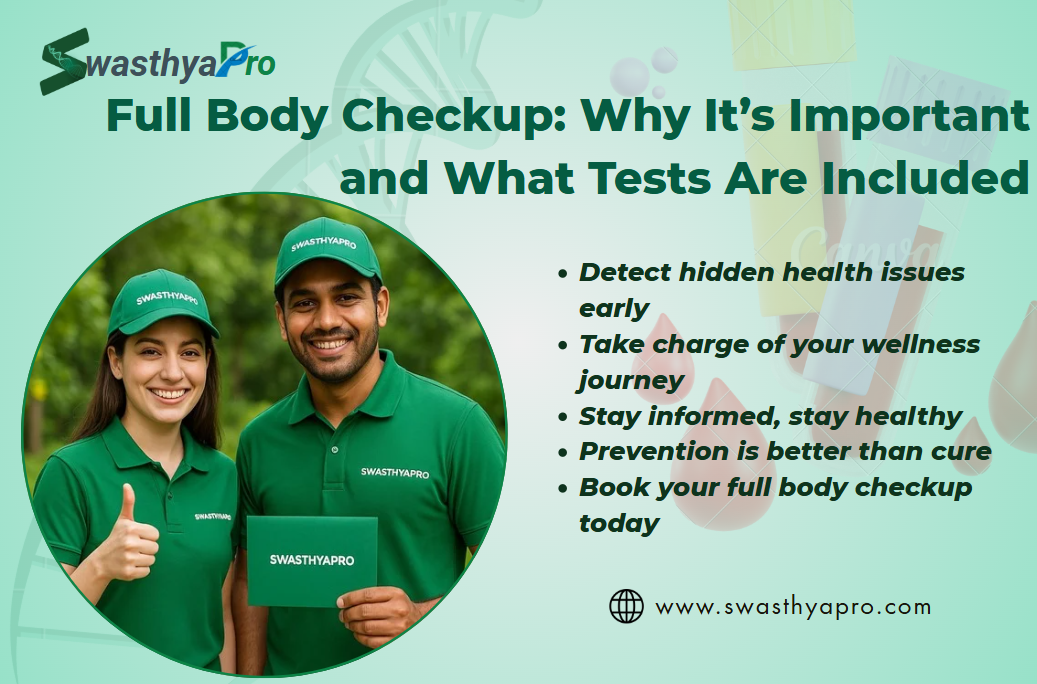Complete Health Screening: The Role of a Full Body Checkup

In today’s fast-paced lifestyle, people often neglect their health until it becomes a serious issue. Many chronic illnesses such as diabetes, hypertension, and heart disease develop silently without obvious symptoms in their early stages. This is why complete health screening plays such a vital role in modern healthcare. At the center of this screening process lies the full body checkup, a preventive measure designed to evaluate your overall health and detect potential risks before they turn into major health problems.
A full body checkup is more than just a collection of tests. It is a holistic health assessment that gives you a clear picture of your body’s functioning. Let’s explore the role of a full body checkup in complete health screening, the tests involved, and why it is an essential part of preventive healthcare.
What is Complete Health Screening?
Complete health screening is a systematic approach to evaluating your overall well-being. It involves a combination of medical tests, physical examinations, and risk assessments. The aim is to identify hidden diseases, deficiencies, or potential health risks at an early stage.
A full body checkup is at the core of this process, covering multiple organs and systems including the heart, lungs, liver, kidneys, thyroid, and even nutritional aspects like vitamin levels.
Why a Full Body Checkup is Central to Complete Health Screening
1. Detects Hidden Health Issues
Many illnesses progress silently. A full body checkup identifies early warning signs of diabetes, liver disease, kidney problems, or heart issues, even before symptoms appear.
2. Monitors Vital Organs
Tests included in a full body checkup evaluate vital organs such as the heart, kidneys, and liver, ensuring that they are functioning properly.
3. Prevents Lifestyle-Related Diseases
With sedentary routines, poor diet, and stress, lifestyle disorders are on the rise. A full body checkup helps detect obesity, high cholesterol, and hypertension early.
4. Guides Lifestyle Modifications
Based on the results of your full body checkup, doctors can recommend diet, exercise, and stress management changes to improve your quality of life.
5. Peace of Mind
Regular checkups offer reassurance that your health is being monitored, reducing anxiety about hidden conditions.
Common Tests in a Full Body Checkup
A typical full body checkup includes a wide range of tests. While packages may differ, most include:
-
Blood Tests: CBC, blood sugar, lipid profile, liver and kidney function tests, thyroid function, vitamin D & B12.
-
Urine Test: Helps detect infections and kidney issues.
-
Heart Tests: ECG, Echo, and stress test for cardiac evaluation.
-
Imaging Tests: Chest X-ray and ultrasound abdomen to check internal organs.
-
Cancer Screening: Optional tests for tumor markers.
-
General Examinations: Blood pressure, BMI, eye and dental checkups.
Together, these tests provide a comprehensive health picture.
Who Should Go for a Full Body Checkup?
-
Young Adults (20–30 years): Once every 2–3 years, unless you have specific health risks.
-
Adults (30–40 years): Every 1–2 years, especially if you lead a sedentary lifestyle.
-
Above 40 years: Annual full body checkups are recommended due to higher risk of lifestyle and age-related diseases.
-
High-Risk Groups: People with family history of diabetes, heart disease, or cancer should get screened more frequently.
Benefits of Regular Full Body Checkups
Early Disease Detection
One of the biggest advantages of a full body checkup is catching diseases at an early stage.
Cost-Effective Healthcare
Preventive care reduces long-term medical expenses by avoiding costly treatments for advanced diseases.
Improved Quality of Life
Early detection and timely treatment allow individuals to maintain a healthier lifestyle and stay productive.
Preventive Healthcare Mindset
Regular checkups create awareness about health and motivate people to take preventive measures.
The Role of Doctors in Complete Health Screening
A full body checkup does not end with the test results. The doctor plays a crucial role in interpreting reports, identifying risk factors, and suggesting appropriate lifestyle changes or treatments. A consultation ensures that the health screening process is meaningful and actionable.
How to Prepare for a Full Body Checkup
To ensure accurate results:
-
Fast for 8–12 hours before the test.
-
Avoid smoking and alcohol at least 24 hours before.
-
Wear comfortable clothes if your package includes treadmill or stress tests.
-
Inform your doctor about ongoing medications.
Conclusion
A full body checkup is the foundation of complete health screening. It helps detect silent illnesses, prevents lifestyle-related diseases, and promotes long-term well-being. By undergoing regular health checkups, you are investing in your future health and ensuring peace of mind.
Remember, prevention is always better than cure. Make full body checkups a part of your healthcare routine and take control of your health before problems arise.



